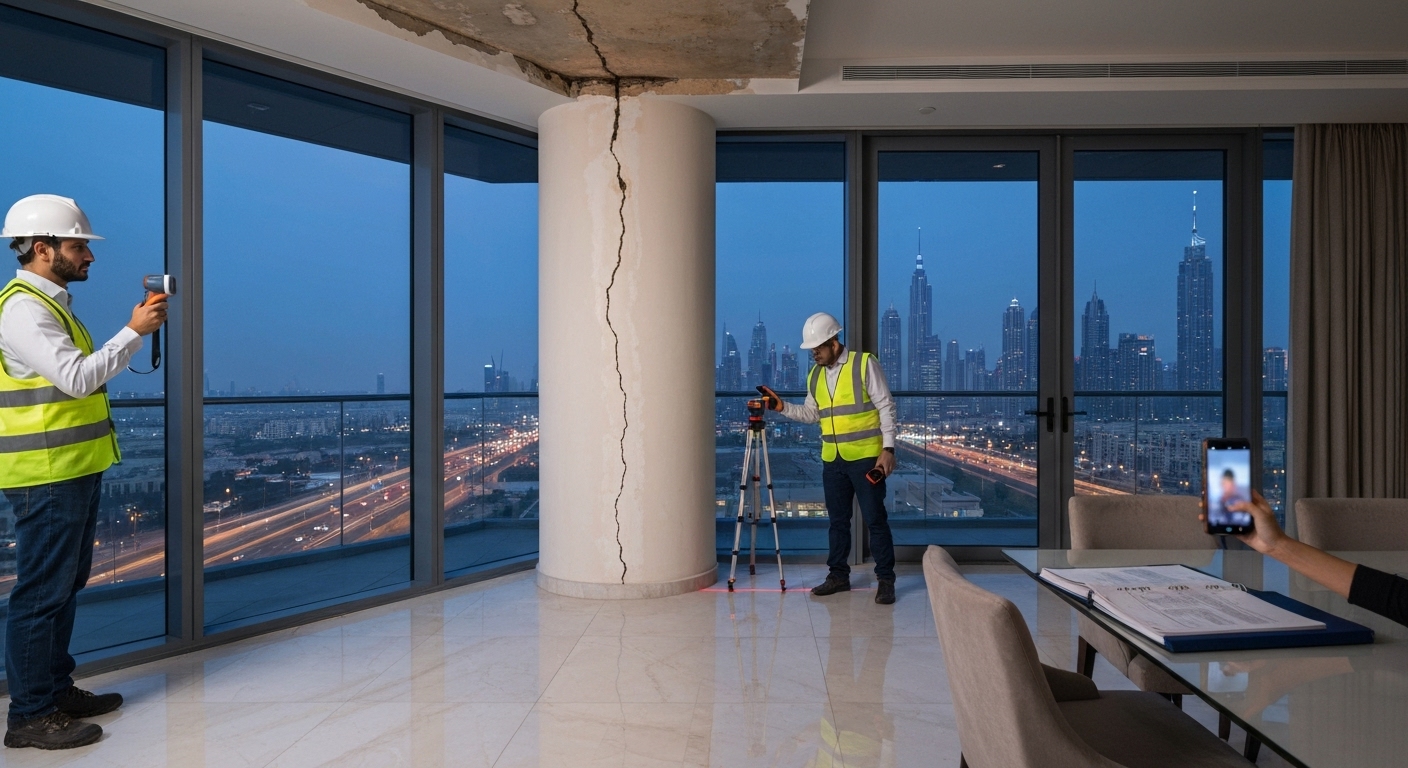If you are asking, “What are the legal steps if my Dubai property has serious construction defects after handover?”, you are not alone. Many new homeowners in Dubai face similar challenges. This guide delivers a clear, Dubai-specific action plan to protect your rights, resolve construction issues, and understand your options if your recently handed-over property has significant defects.
Understanding Your Rights: Dubai’s Defect Liability Periods
Dubai’s robust property laws provide a defined defect liability period for new homeowners. After handover, developers are typically responsible for rectifying any construction flaws within a set timeframe. Structural defects—such as those impacting foundations, roofs, or load-bearing walls—are usually covered for ten years from the handover date. Non-structural or “snagging” issues (like leaking taps, AC problems, or cosmetic issues) are often covered for a year. These periods aim to ensure that every owner, whether in Jumeirah Village Circle, Al Furjan, or emerging areas like Dubai Silicon Oasis, enjoys their investment as initially promised.
Keep in mind: if you discover a fault, acting during these liability periods is critical. Delays can mean the difference between easy rectification and a drawn-out dispute. Your original handover documents should specify exact start dates for these timelines, which protect your rights throughout Dubai’s diverse neighborhoods.
Identifying Serious Construction Defects: Documentation and Evidence Collection
Identifying and recording every defect is the critical foundation of any claim. Serious construction defects include issues that compromise safety, structure, or livability, such as cracks in pillars, water seepage, faulty electrical wiring, or non-operational HVAC systems. Begin with a thorough inspection as soon as possible post-handover.
How to Document Effectively
– Take clear, date-stamped photographs and videos of all identified issues.
– Collate snag or inspection lists from handover day.
– Retain all communication with the developer, including WhatsApp and email exchanges.
– Store all warranty documents and contracts in one secure file.
If warranted, consider engaging a qualified inspector familiar with Dubai’s building codes. Their professional reports can greatly bolster your evidence should you need to take the issue further.
Formal Notification: Initiating Your Claim Against the Developer
The first formal step is a written notification to your developer. Prepare a letter or email clearly listing all defects, supported by your documentation. Address it to the official customer service channels specified by the developer—especially relevant in communities served by major firms like Danube Properties. Your communication should:
– Reference your property details and handover date.
– Specify the nature and exact location of all defects.
– Request urgent rectification within a reasonable timeline (typically two weeks for non-critical defects, sooner for severe ones).
– Request written acknowledgment of your claim.
Keep copies of every piece of correspondence and set reminders to follow up if you receive no response.
Example: Structuring an Effective Notification
A well-structured notification might read:
“Dear [Developer],
I am the owner of unit #XY in [Danube project name, e.g., Gemz by Danube]. Following the handover dated [insert date], I have identified the following serious construction defects: [list defects]. Attached are photographs and a summary inspection report. Kindly arrange for inspection and repair within 14 days. Please confirm receipt of this notice.”
Navigating Developer Responses: Repair, Rectification, or Dispute?
After formal notification, most reputable developers in Dubai, like those operating in Jumeirah Lake Towers or Al Barsha, will arrange inspections or schedule repairs within the announced timeframe. If repairs proceed, document all remedial work for your records.
However, if the developer disputes liability, offers substandard repairs, or is non-responsive, escalate accordingly. In unresolved cases, you may approach Dubai Land Department’s Real Estate Regulatory Agency (RERA) for mediation or seek guidance from the Dubai Courts system for legal action.
Escalating the Issue: Official Channels and Legal Recourse in Dubai
If internal escalation fails, Dubai’s official regulatory channels step in. Submit a formal complaint to RERA, which may investigate and mediate between parties. If no satisfactory outcome is reached, you have the right to file a civil claim in the Dubai Courts. Here, professional legal advice is crucial. The court may appoint independent experts to review your case and determine financial liability for repairs or compensation.
Throughout this process, maintain organized records—your evidence will be vital in determining outcomes, especially considering Dubai’s investor-friendly property protections.
Preparing for Potential Legal Action: Gathering Support and Expert Advice
Should you need to go to court, gather as much expert support as possible:
– Commission an independent building survey.
– Secure legal advice from firms specializing in Dubai real estate disputes.
– Speak to other owners in your building; collective action often strengthens your position.
Protecting Your Investment: Proactive Measures Before and After Handover
To avoid future issues, schedule detailed “snagging” inspections before accepting handover keys. Keep a written record of all defects, and ensure the developer provides signed confirmation of their commitment to rectify. After handover, conduct periodic inspections and keep in close contact with your building management.
In summary, if you’re asking, “What are the legal steps if my Dubai property has serious construction defects after handover?”, be proactive: know your rights, document every detail, notify the developer promptly, escalate if needed, and consider legal action when appropriate. For clarity on your property rights or for assistance with a claim, contact Danube Properties to learn more.
If you want detailed legal checklists and common legal mistakes to avoid—especially around inspections and snagging—see Avoid Legal Mistakes Buying Dubai Property as Expat.




